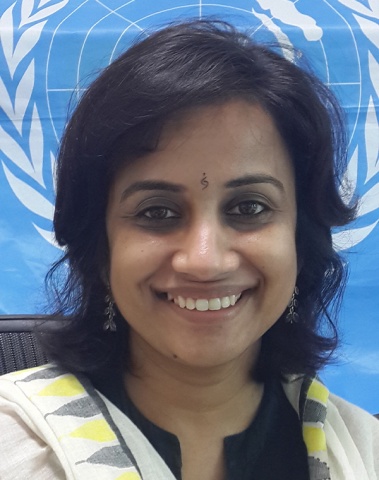The Ford School gave me the ability to discern research easily. They built a strong framework to understand research methodologies and unpack what data is telling us and how we can use that to our advantage.”

Tannistha Datta
First job out of Ford School: Research Associate - William Davidson Institute
Since volunteering with a children’s nonprofit in high school, Tannistha Datta (MPA '09) wanted to pursue children’s rights protection work. At the Ford School, this desire was confirmed. "Through policy and international development frameworks, the Ford School helped me reconfirm the notion that children's rights are human rights, and that I wanted to pursue the preservation of those rights as a career," said Datta. Now the child protection specialist at UNICEF, Datta works with statewide civil society organizations, social workers, and the Indian government to preserve and enhance policies that best protect vulnerable children.
Datta's work goes beyond service provision into big picture protection policy. "My role is to look at justice for children’s issues and how that can be strengthened. It's a whole range of issues, be it violence against children, labor, or ensuring all children are treated in the same way under the legal system," she explained. Her work spans 17 states, making up 70 percent of India’s population.
Over time, Datta formed a strong partnership with India’s Supreme Court, which has been instrumental in pushing legal policy forward. "We advocate for increased budget allocation for child protection and lead a committee to look at children’s issues," she said. "We share evidence on what's working and what's not via studies and consultative workshops, and we are really able to show that child protection has been a very neglected secor."
This partnership has proved particularly beneficial during the COVID-19 child protection response. Datta explained that many children are in the care of the state in detention centers or other federal oversight. To decongest prisons and ensure access to basic sanitation, Datta and her team helped the Supreme Court draft guidelines for stakeholders wanting to help these children.
As a result, 300,000 children were released to their families with special temporary measures including children who were in conflict with law and released on bail.
Datta chose the Ford School for its mid-career degree offering and the diverse environment. Coming in with eight years of work experience, Datta wanted a high-caliber, one-year program.
The research analysis skills gained at the Ford School have helped Datta form policy. "At UNICEF we get flooded with information, and we have to design research. I’m not a statistician, but I can work with colleagues who have those skills and help build the design. The Ford School gave me the ability to discern research easily. They built a strong framework to understand research methodologies and unpack what data is telling us and how we can use that to our advantage," she said.